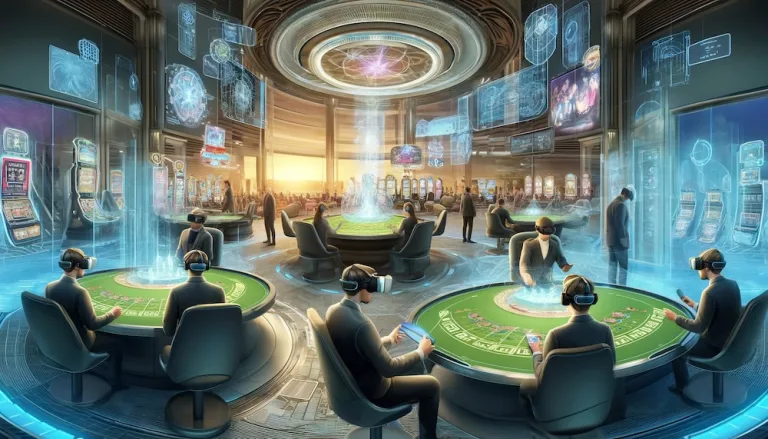The casino industry is undergoing a remarkable transformation, influenced heavily by technological advancements. Virtual casinos, once a futuristic fantasy, are now becoming a reality thanks to Virtual Reality (VR) technology. This innovation is not just changing the game for players but is also setting a new paradigm for how casinos operate and engage with their customers.
One of the pioneering VR casinos is SlotsMillion, which launched its VR gaming room a few years ago and has continued to refine the experience. In SlotsMillion, players can walk through a digitally created casino, interact with one another, and play more than 40 different slots games. The realism of the environment, combined with the immersive aspect of VR, has been met with both enthusiasm and criticism. While many praise the captivating graphics and engaging experience, others are wary of the potential for increased gambling addiction due to the intense immersive environment.
Artificial Intelligence: The Brain Behind the Operation
Alongside VR, Artificial Intelligence (AI) is playing a crucial role in reshaping the gambling industry. AI’s impact is multifaceted, enhancing customer service, security, and gaming outcomes. One of the standout applications of AI in casinos has been in the form of sophisticated chatbots and personal assistants that provide 24/7 customer service. These AI-driven systems can handle a myriad of player requests, from account issues to game recommendations, all without human intervention.
However, the use of AI doesn’t stop there. It extends into the realm of gaming fairness and security. Algorithms are being developed that analyze player behavior to identify problematic gambling patterns and intervene where necessary. These systems can provide warnings to players and even enforce cool-off periods, thus advocating for responsible gambling practices.
Transformative Trends: More than Just Technology
While VR and AI are at the forefront of technology in the gambling world, other trends are also shaping the industry’s future. The rise of cryptocurrency in casinos is one such trend. Many online platforms are now accepting Bitcoin and other digital currencies as forms of payment, citing quicker transactions and increased security due to blockchain technology.
Another significant trend is the introduction of skill-based gaming in casinos. This new genre aims to attract younger players who may not be interested in traditional casino games like slots or roulette. Games that require skill offer a different type of engagement, where the outcome is based on the player’s ability rather than chance. This shift is seen in the development of video game-like casino games and competitive gaming tournaments hosted by casinos.
Regulatory Challenges and Social Implications
With innovation comes the challenge of regulation. Jurisdictions around the world are grappling with how to frame laws that address the unique aspects of VR casinos, AI applications, and crypto transactions in gambling. The regulatory landscape is complex and varies widely from one region to another, often lagging behind technological advancements.
Social implications are equally significant. There is an ongoing debate about the ethical ramifications of using immersive tech and AI in gambling. Critics argue that these technologies could lead to higher rates of gambling addiction, while proponents believe they offer a safer, more controlled environment that can reduce problem gambling behaviors.
What Does the Future Hold?
Looking ahead, the gambling industry is set to continue its trajectory of rapid innovation. The future may see a greater fusion between social gaming and gambling, where community and competition play central roles. Also, as regulatory bodies catch up with technological advances, there could be more standardized practices that ensure the safety and fairness of the gambling ecosystem.
Moreover, as public perception shifts, we may witness a greater emphasis on gambling as a form of entertainment rather than merely a chance-based money-making activity. This would fundamentally change marketing strategies and game development.
In conclusion, the integration of VR, AI, and other emerging technologies into the gambling industry promises to create more engaging and responsible gaming experiences. Despite the challenges and criticisms, these innovations have the potential to redefine what it means to gamble in the 21st century, making it crucial for stakeholders to navigate these changes thoughtfully and ethically.

Garry Sputnim is a seasoned journalist and storyteller with over a decade of experience in the trenches of global news. With a keen eye for uncovering stories that resonate, Alex has reported from over 30 countries, bringing light to untold narratives and the human faces behind the headlines. Specializing in investigative journalism, Garry has a knack for technology and social justice issues, weaving compelling narratives that bridge tech and humanity. Outside the newsroom, Garry is an avid rock climber and podcast host, exploring stories of resilience and innovation.


